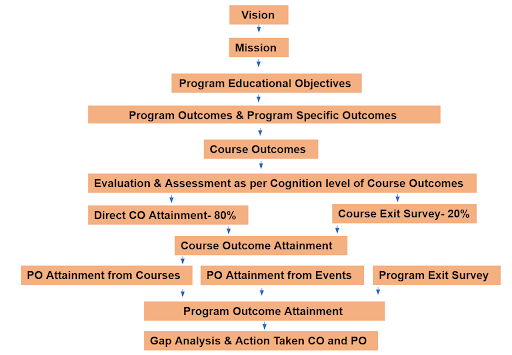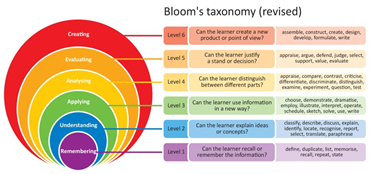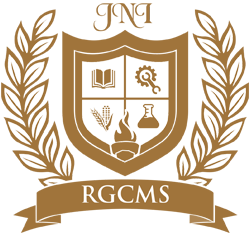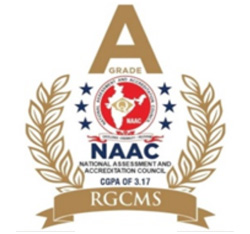Outcome Based Learning

With adaptation of OBE, the curriculum dynamically adapts to the
requirements of the different stakeholders like Students, Parents, Industry Personnel and Recruiters. OBE is all about feedback and outcomes. The four levels of Outcomes that the Institute thrives to achieve from OBE are:
- Course Outcomes (COs) – Outcome statements describe what a student should know, understand and/or be able to demonstrate after completion of each aligned course under the program.
- Program Outcomes (POs) – Outcome statements describe what students should know and be able to do at the end of the program. POs are to be in line with the graduate attributes as prescribed by the NBA.
PO1 – Apply knowledge of management theories and practices to solve business problems
PO2 – Foster Analytical and critical thinking abilities for data-based decision making
PO3 – Ability to develop Value based Leadership ability.
PO4 – Ability to understand, analyze and communicate global, economic, legal, and ethical aspects of business.
PO5 – Ability to lead themselves and others in the achievement of organizational goals, contributing effectively to a team environment.
- Program Specific Outcomes (PSOs) – Outcome statements describe what the graduates of a specific management program should be able to do at the end of the program.
PSO1 – Conceptualize and implement business schemes through the application of multidisciplinary knowledge comprising of Operations, HR, IT, Finance and Marketing.
- Program Educational Objectives (PEOs) – Outcome statements are about professional and career accomplishment after 4 to 5 years of graduation. PEOs are statements that capture a graduate’s developing essence from different perspectives like Career, Technical Competency and Behavior.
PEO1 – Life Long Learning- Our graduates will be able to engage in continuous professional development with ability to innovate, develop knowledge and implement dynamic management processes.
PEO2 – Techno Functional Ability: Our graduates will be able to apply technological and domain specific knowledge, learnt through curriculum and industry interaction, required to analyze and solve industry problems.
PEO3 – Professional Excellence: Lead by an example in company and society through qualities like ethics and social values.
PEO4 – Leadership Skills: Exhibit qualitative skills to work either in team or as an individual through good communication, leadership, decision making skills.
CO-PO Course Articulation Matrix Mapping & Blooms Taxonomy
- Course Articulation Matrix – It showcases the educational relationship ie. (level of learning achieved ) between Course Outcomes and Program Outcomes for a Course. This matrix strongly indicates whether the students are able to achieve the course learning objectives. The matrix can be used for any course and is a good way to evaluate a course syllabus.
- Bloom’s Taxonomy – The below table showcases revised information about the Levels of Knowledge Cognitions used to frame using respective action verbs in the framing of Course Outcomes and depicting the nature; stating whether the COs are theory or application based, technical or non-technical. This helps our faculty members to understand the intention of each COs and the Bloom’s level to which each of these action verbs in the COs correlates to. Only after clear understanding of a subject, faculty writes the Course Outcomes for respective subjects.

Advanced Learner & Slow Learner
At RGCMS, we focus on classification of students as Advanced Learners & Slow Learners. This aims to achieve a better learning experience for different students.
All respective course faculties conduct (BASIQ) Basic Aptitude & Subject Intelligence Quiz, Include Teachers Observation & First Subject evaluation test to calculate scores & understand Advanced & slow learners in a particular class.
This classification helps each course faculty in revising their course lesson plans i.e. revise framing of cognition level to attain course outcomes through course content delivery.
The classified Slow learners for particular subjects are then availed of mandated tutorial sessions apart from regular lecture sessions for better understanding, grasping & application of the subject concepts.
Whereas the classified Advanced learners for a particular subject are given advanced assignment/ live projects for better exposure to the applicability, creativity & innovation related to the subject concepts. They are also encouraged to participate at intercollegiate level curricular events such as research publication, conferences, entrepreneurship exploration, etc.
Assessment Process
- Evaluation scheme (Internal / External) – All assessment criteria are mapped with Course Outcomes of respective subjects whether they are a part of Internal or External Assessment.
- Internal Assessment criteria carry 40% marks for each subject. The assessment tools such as Attendance & class participation(Mandate) and Class quiz/ Tests, Assignment, Group Presentation/ Role-plays/ Orals/Case Study (Rubrics).
- External Assessment criteria carry 60% marks for each subject. Question Papers are mapped with Course Outcomes of respective subjects. Subject wise Evaluation schemes are prepared by faculty members for better Assessment Evaluation.
- Course Outcomes Attainment: Direct CO Attainment is achieved for every course by mapping all assessment questions whether a part of Internal or External examination. Indirect CO Attainment is achieved for every course by asking course outcome-based questions in respective Course exit survey.
- Program Outcomes Attainment For a batch: Direct PO Attainment is calculated by consolidating PO Attainments for all respective courses. Indirect PO Attainment is calculated by consolidating Program exit survey, PO Attainments for all Co-curriculum & Extracurricular activities namely Training, Webinar, Add on Courses, Industrial Visits, Cultural Event, etc.
Assessment Pattern
Continuous Internal Evaluation (CIE) (40%)
- Any three Tools* (30%)
- Attendance and Participation (10%)
Semester End Examination (SEE) (60%)
- Pen and Paper or
- Project Based
Assessment Tools
- Project/ Report Based Viva-voce/ Presentations, Class Quiz (MCQ), Open Book Test, Assignments, Viva-Voce, Case Study/ Case let Analysis, Situation Analysis, Field Visit / Study tour, Role Play, any Innovative assessment, etc

























